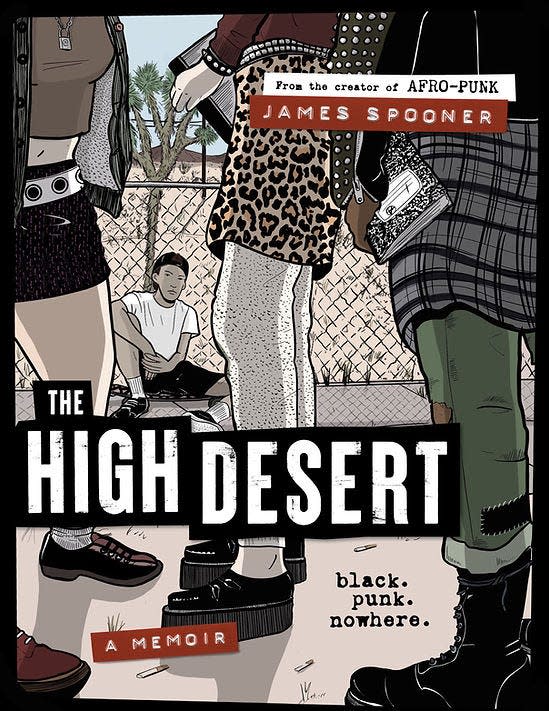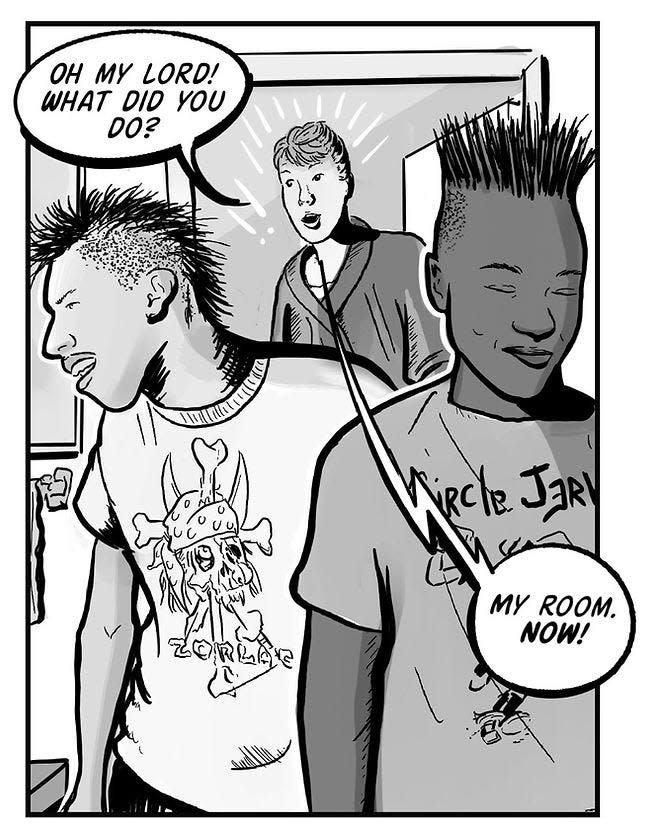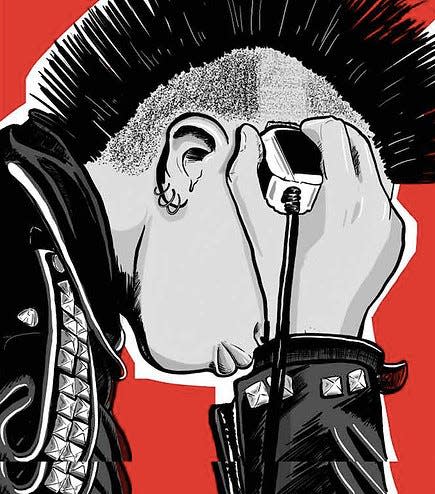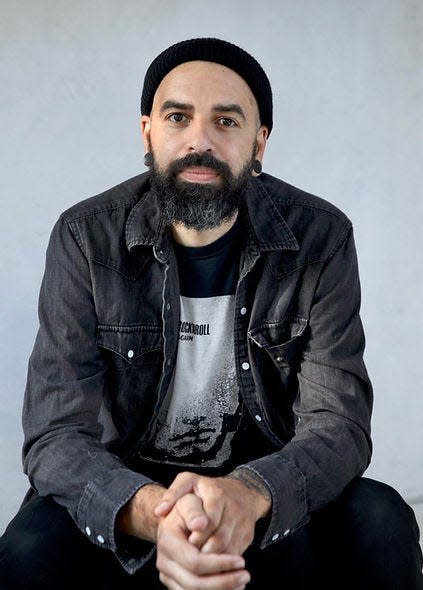James Spooner's award-winning graphic novel chronicles the High Desert punk movement in the 1980s
James Spooner is an author, illustrator, director, and vegan tattoo artist who lived in the High Desert for nine years of his childhood.
Spooner debuted his first graphic novel in 2022, "The High Desert," which chronicles his experience as a multi-ethnic youth in the High Desert during the '80s and '90s.
The coming-of-age narrative parallels the DIY punk movement, a punk subculture that emphasizes community involvement. The "do it yourself" mentality produces its own music, media, events, and culture without the engagement of corporations.

The novel is now a 2023 recipient of the American Library Association's Alex Award and the Cartoonist Studio Prize.
Spooner also published a Black punk anthology in 2023, "Black Punk Now." His second work novels the voices of Black punks from both recent and "pioneering" times using graphics, poems, short stories, and lyrics.
A third book, acquired by Pantheon Books, is also in the drafts. This second memoir will be a prose-comics dual, a true hybrid moment. Additionally, there is talk of a possible "The High Desert" television series based on the graphic novel, but the project is in its preliminary stages, according to Spooner.
Crafting 'The High Desert'

Certainly the first of its kind to come from the area, "The High Desert" strategically illustrates the adversities Spooner faced as a minority in Apple Valley.
The story of identity and belonging began decades before the 2022 release. Spooner said he drafted and illustrated the story over the course of five years, but he started exploring his creativity more seriously with filmmaking, producing the Afro-Punk documentary in 2003.
The award-winning documentary includes interviews with 80 different African American punk rockers throughout the United States and tackles several different topics around Black identity.
Unfortunately, the film industry was filled with gatekeepers instead of TV parties, according to Spooner, making it difficult to expand his novice filmmaking career. His partner introduced him to memoir comics, which aroused the realization that he could make a movie by himself on paper- a graphic novel.
With a lifetime's worth of illustration experience and the already-developed knack for crafting a script, all the pieces of the puzzle aligned for Spooner to publish his debut book.
A memorable memoir

An Ishmael of the High Desert, Spooner said he struggled with accepting his multi-ethnic background amid the blatant racism he battled as an early teen in '80s-era Apple Valley.
He didn't fit in with the "skinheads," "normals," or the "hoods" of his school, rather, he found that his group would be marked by needle-sharp spiked hair, band T-shirts, leather jackets, and spiked jewelry, he said.
Spooner said his self-esteem dwindled every day in Apple Valley, which he attributed to peer ridicule and his regular trips to the principal's office for dress code violations, reaffirming that he wasn't a good kid.
His self-awakening was spurred by finding the punks of the High Desert.
Skaters and "unhappy young rebels caught up in the punk groundswell sweeping the country" became Spooner's adopted family during his time in the High Desert, he said. The novel also portrayed his introduction to Black punks, who didn't compromise their "Blackness" to adopt an overwhelmingly white noise lifestyle as instrumental to his character evolution.
Spooner said his absent father and full-time working mother bonded him with other punks experiencing the same sort of angst towards their parents that one feels listening to the Adolescents' "Parents."
Neo-Nazi fascism, distracting dress-code violations, and the narrow-mindedness of the High Desert youth, as discussed in the graphic novel, contributed to his decision to finish high school in New York.
Once he transferred to a New York high school, Spooner said he was no longer sent to the principal's office.
"I only changed my location, not my character," he said. "Not being told that I was 'bad' made me feel good on a whole new level."
Being able to express himself in a more metropolitan space also made Spooner realize that he wasn't the problem.
"I thought that kids walking around with swastikas on their folders was normal. I thought being called the n-word was normal and somehow acceptable, that something was wrong with me," Spooner told the Daily Press. "It wasn't until I left that I realized I wasn't the problem, the others were."
Spooner's message

Spooner's advice to High Desert residents facing similar issues of adversity is to leave.
He doesn't mean to imply that the desert is unredeemable. Spooner said he can only attest to his experience, and while there may be High Desert opportunities for some, they weren't for him.
"If you don't leave, you'll never know what's wrong or how to fix it. You'll never have any new ideas," he said.
Leaving the bubble of the High Desert allows the artistic skills to mature, according to the author, and lets one discover who they are without degradation.
And you can always come back, Spooner added.
"Do something really punk rock and you'll see how far reaching it can be," shared "The High Desert" character Blanca.
Spooner also shared advice to High Desert residents facing discrimination.
"You don't need to put yourself in dangerous situations, get out if that's the case," he said. "I hope the graphic novel adds to the conversation and changes or inspires change within the High Desert community."
Being true to oneself in the midst of “regulars” and finding individuality, whether from DIY punk or elsewhere, is the main takeaway from "The High Desert."
"You are completely OK as you are," Spooner said. You got it.
"The High Desert" can be purchased on Spooner's website, spoonersnofun.com, or other sources like eBay, Amazon, and Thrift Books.
**Everything in italics is a punk song used in Spooner's graphic novel "The High Desert."
This article originally appeared on Victorville Daily Press: 'The High Desert' graphic memoir written by local High Desert punk

